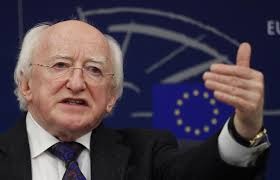
Drifting into impotence
While Margaret Thatcher’s state funeral last Wednesday was the occasion for VIP’s and angry protestors to praise or blame her for the shape of modern Britain, the President of Ireland was delivering a passionate speech in the European Parliament which prompted a standing ovation.
The simultaneous events both carried warnings about the transience of power, prestige and wealth. For, in Strasbourg, President Michael Higgens minced no words as he warned the representatives from 27 European countries about threatening storms.
People across Europe were suffering, he said, because of the influence of big players in the world of finance and money markets who were not accountable. The current, dominant economic policy was the ‘flaw of our times’, he told the Euro-parliamentarians, and called for new models that connected with citizens and society.
Today there were 26 million people across the Union without work, 5.7 million young people, and 115 million in or at risk of poverty and social exclusion. We could not allow this to continue, he cautioned.
In his opening remarks, Higgens referred to the ancient contribution of Celtic monks to European scholarship which had laid a foundation for a Euro-consciousness in the Irish mind.
He recalled the gathering in Luxeuil-les-Bains, France, in July 1950 to celebrate the 1400th anniversary of the birth of Columbanus, one of Ireland’s greatest scholars and missionaries. From Bangor near Belfast, Columbanus and his fellow monks, including St Gall, established centres of learning, study, manuscript production, monasteries and communities in France, Switzerland, Germany and Italy.
Inclusive
That meeting, said the president, had been the occasion for leaders from a number of European countries to meet with Robert Schuman, Foreign Minister of France, and to hear his great ideas for the coming together of the countries of post-war Europe.
Schuman himself had evoked the memory of the early monastic perigrinatio and had declared Columbanus to be ‘the patron saint of all those who now seek to build a united Europe’.
That Luxeuil meeting came a mere two months after Schuman surprised the world on May 9, 1950, with his out-of-the-box proposal that the Germans should be treated on the same level as the French in the creation of a coal and steel community (what I like to call ‘the defining moment of post-war Europe’).
Higgens urged his listeners never to forget that Schuman and the other founding fathers drew on ‘the rich scholarship, moral instincts and generous impulses of European thought as they sought, not only to replace war with peace, but more importantly, to construct a vision of Europe’s people working together in an inclusive way’.
Yet the legacy of the founders of the European Union could not be taken for granted today, lamented Higgens. Europeans were threatened with an unconscious drift to disharmony, he warned, a loss of social cohesion, a recurrence of racism and an increasing deficit of democratic accountability in economic decision-making. These were threatening clouds hanging over Europe.
Drifting
How would the founders of the European Union respond to our present circumstances, he asked his audience.
It had been many years since Jacques Delors declared that ‘Europe needed a soul’, but it remained just as true. Europeans were in danger of drifting into a moral and intellectual impotence, he said drawing attention to the ’profoundly important set of European values’ on which the founders built. He specifically mentioned the Judeo-Christian tradition and the Reformation as contributors to these values.
I happened to be in Dublin last Wednesday, preparing for the upcoming State of Europe Forum*, as the news channels carried reports of both the speech and the London funeral. I was struck by how much the president seemed to be anticipating what the forum was about. It would have a made a great opening speech for that event on May 9 &10! For he too was warning of multiple crises facing Europe. He too was urging a radical rethink of economics, a return to the values of the founding fathers and a fresh commitment to solidarity and partnership.
Time Magazine’s essay this week reflected on Thatcher’s funeral as being ‘a cautionary tale devised to illustrate the limits of temporal power’. Many attending the funeral were ‘former somebodies, trailing their great futures behind them’.
That could be true of Europe too, if we ignore the president’s warnings.
Till next week,
Jeff Fountain
*Register now at: www.stateofeuropeforum.eu

This Post Has 0 Comments